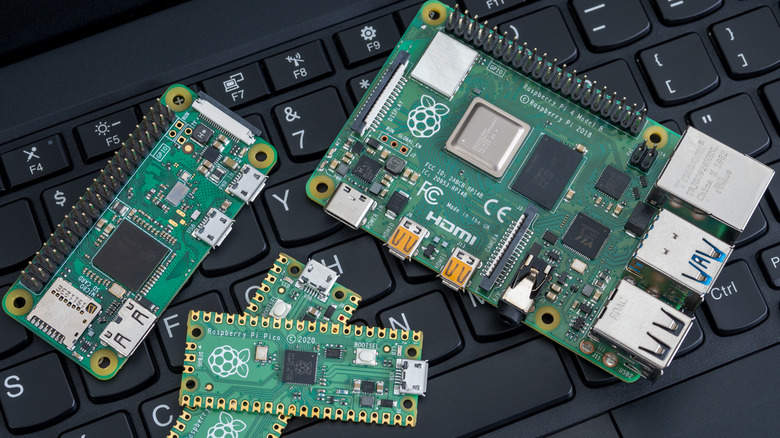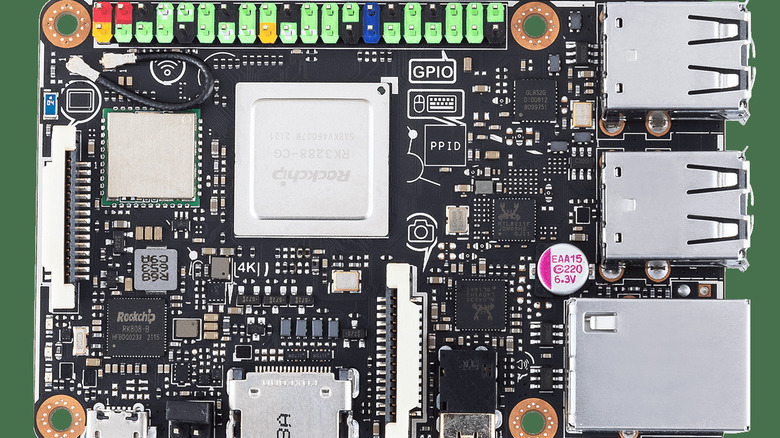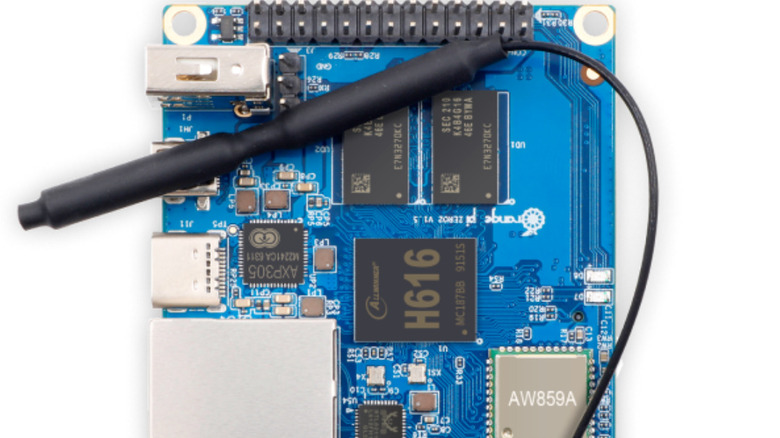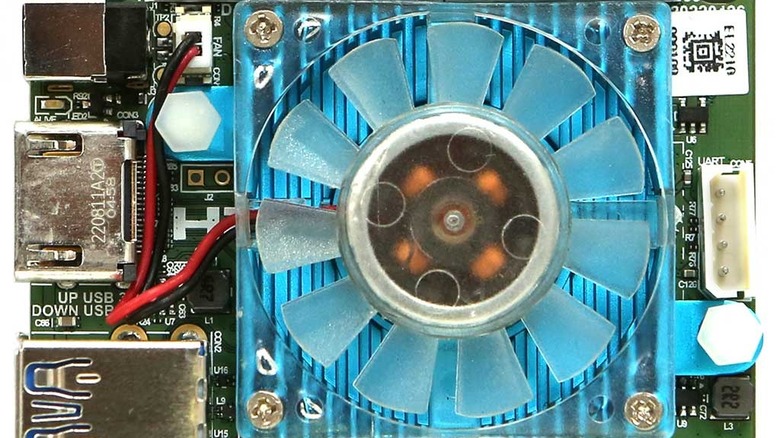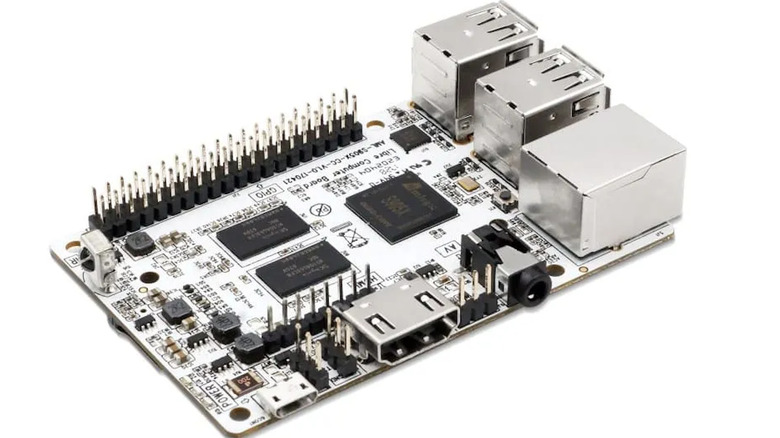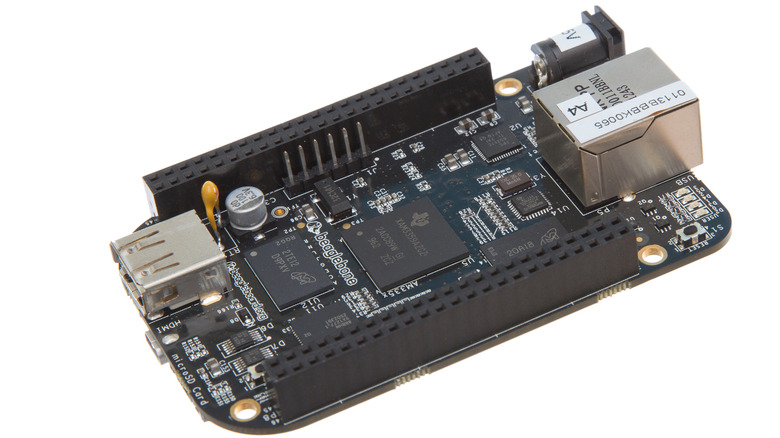5 Raspberry Pi Alternatives To Check Out In 2023
We may receive a commission on purchases made from links.
Since its debut in 2012, Raspberry Pi has gone from a quirky-named curiosity to the most successful computer made in the United Kingdom, and an icon for DIY computer hobbyists and engineers everywhere. Developed by the Raspberry Pi Foundation in association with Broadcom, the single-board computer (SBC) is tiny, low-cost, and extremely customizable, allowing for it to be integrated into all kinds of hardware and has countless innovative uses.
Because of this, Raspberry Pi has grown from its original intended use as a learning tool for computer science students to a favorite of electronics and computer hobbyists. Many have built Raspberry Pi into everything from robotics, to weather stations, to personalized TVs that only play "The Simpsons."
Raspberry Pi has expanded with multiple iterations and generations, including the Raspberry Pi 4 Model B launched in 2019, and the Raspberry Pi Pico W launched in 2022. It remains a top choice for many programmers and engineers. However, because of continuing price increases and supply chain issues, it's become more difficult to obtain and use in recent years.
Fortunately, Raspberry Pi has inspired many other companies to enter the market, and DIYers and other engineers, programmers, and inventors now have several good options when it comes to purchasing SBCs. Whether it's availability, a specific model, or just being personally comfortable with a brand other than Raspberry Pi, it may be worth it to look elsewhere for the next project's SBC.
Asus Tinker Board S R2.0
If someone made a list of everything they'd want in a Raspberry Pi alternative, the Asus Tinker Board S R2.0 checks off nearly every box; including power, compatibility, connectivity, and design. Its foundation especially makes it stand out from the Raspberry Pi, with a color-coded GPIO header and detailed silk-screen print that cleanly maps out the board, making it intuitive and easy.
For those intending to use a Raspberry Pi alternative for gaming, the Asus Tinker Board S R2.0 is a fantastic choice. Its 1.8GHz Rockchip quad-core processor is solid, and includes 2GB dual-channel RAM and 16GB memory, which should be enough speed and power for most projects.
It also has a dedicated audio codec and an impressive slew of ports, including four connections for USB 2.0 and one for gigabit Ethernet, as well as HDMI and a 3.5mm audio jack. The Asus Tinker Board S R2.0 is also compatible with several operating systems, including Android. Something to keep in mind, however, is its lack of onboard Wi-Fi and Bluetooth. These can be added externally, but considering its other major downside — it's hefty price tag — it's an unfortunate omission.
Orange Pi Zero 2
A key characteristic of the Raspberry Pi is its balance between performance and cost, and the Orange Pi Zero 2 does a great job with matching that balance. Like the former, its small footprint and low price make it accessible for a wide range of uses, including smart home and other personal-use projects.
Don't let its compact size fool you, because it still has a decent amount of power, thanks to its 1.5 GHz quad-core ARM Cortex-A53 CPU and Mali-450 MP2 GPU. The Orange Pi Zero 2 also includes two USB 2.0 ports and a gigabit Ethernet connection, as well as a versatile USB-C port for power.
Additionally, the Orange Pi Zero 2 can connect to even more peripherals thanks to its built-in Wi-Fi and Bluetooth. Because it's also compatible with several operating systems (including Android), there are countless applications available to the computer. However, gaming or multimedia wouldn't be one of those, considering its RAM is limited to just 1 GB. Keep that lower performance in mind when considering its reasonable $36 price tag.
Hardkernal Odroid N2+
For users looking for a slightly more advanced computer than the Raspberry Pi, the Odroid N2+ is a great option. For an SBC, it's a powerhouse, with a hexacore processor, Mali-G52 GPU, 4GB RAM, and up to 128GB memory. It's also energy efficient, giving it a lot of performance in a small package.
The Odroid N2+ can also run multiple different operating systems, including Linux, Ubuntu, and Android. The Odroid N2+ includes all the basic ports you'd want out of an SBC, including HDMI, four USB 3.0 ports, and a gigabit Ethernet port. With the right accessories, you could replace your desktop computer with this particular SBC.
However the Odroid N2+ is one of the pricier options available, which isn't a surprise considering what it has to offer. While there's a robust community of users who can support newcomers, its more advanced setup might not make it the best choice for beginners looking for something simpler.
Libre Computer Board AML-S905X-CC (Le Potato)
The Libre Computer Board AML-S905X-CC is a great alternative to the Raspberry Pi, not just as a computer, but also as a device with a food-based name — considering its "Le Potato" moniker. With a 1.5 GHz quad-core ARM 64-bit processor, ARM Mali-450 GPU, and dedicated HDR Display Engine for HEVC and VP9 hardware decoding, it's a great choice for playing 4K Ultra HD content at 60 FPS.
It's easy to connect such 4K content to the Libre Computer Board, thanks to its included MicroSD Card Slot, which allows users to swap cards as much as you'd like to give the SBC unlimited storage space and a wide range of uses. At just $35, the Le Potato continues the spirit of Raspberry Pi's typical affordability. However, Le Potato is also limited by its 2GB RAM, 100MB Ethernet, and lack of USB 3.0 connectivity, so that price tag only takes users so far.
BeagleBone Black
For those who are looking for an SBC that isn't as expensive as powerhouses like the Asus Tinker Board S R2.0 or Odroid N2+, but has a little more juice than the Orange Pi Zero 2 or Le Potato, a solid middle-of-the-road option is the BeagleBone Black. Powered by a 1GHz ARM Cortex-A8 processor with a dedicated 3D graphics accelerator, as well as 4GB flash memory and 512MB RAM, the BeagleBone Black can run a lot of the applications a Raspberry Pi can.
BeagleBone's Black board is compatible with platforms like Android and Ubuntu, and can boot Linux through a USB input in under 10 seconds. However, neither of its USB ports are 3.0, and one may need both to attach Wi-Fi and/or Bluetooth to the computer, because neither are built-in natively. The BeagleBone Black does include an HDMI and Ethernet port, however.
Its design and specs make it ideal for IoT (internet-of-things) projects, though with the right peripherals, its processing power can be applied to many other uses. If one already know what they need an SBC for, and don't want to break the bank on more powerful options, make sure the specs of the BeagleBone Black makes it the right Raspberry Pi alternative for you.
